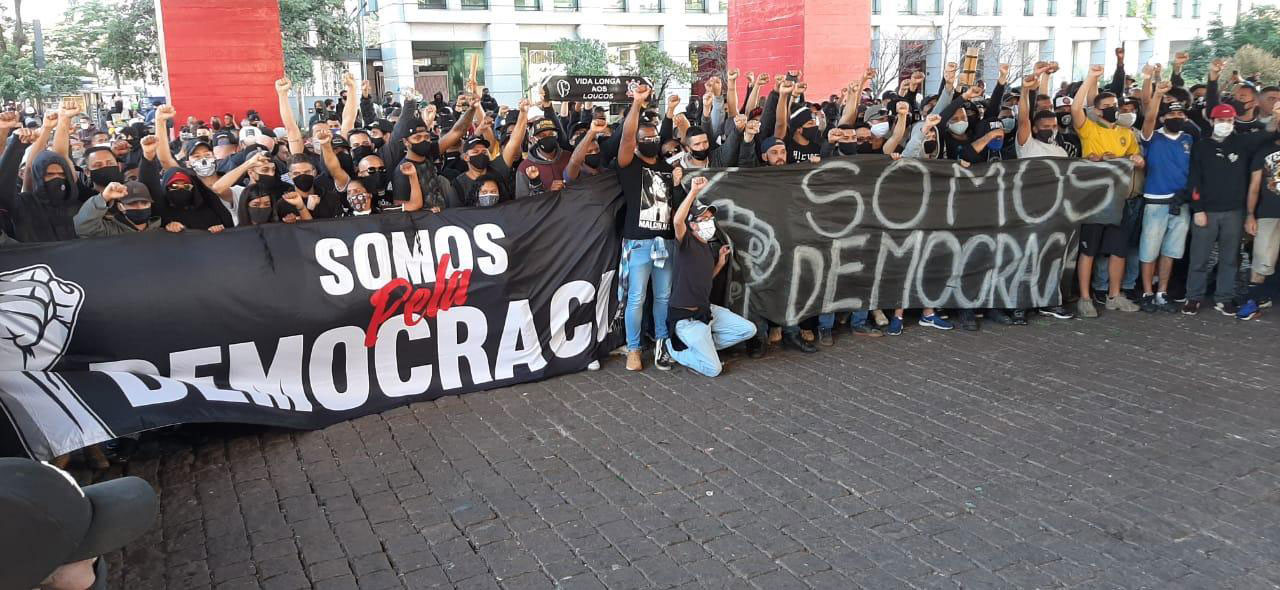On Sunday May 31, mask wearing protesters broke quarantine to demonstrate for the removal of President Jair Bolsonaro, and against his efforts to decapitate Brazilian democracy by closing Congress and the Supreme Court. The protests occurred in major cities across the country.
In São Paulo the demonstration on Avenida Paulista was led by an alliance of anti-fascist organised supporters from football clubs such as Corinthians, Palmeiras Santos and São Paulo, who chanted “The Periphery does not support a Dictator!” as they marched towards the MASP museum of modern art, atraditional meeting place for political demonstrations.
The pro-democracy protest dwarfed a rival group demonstrating in support of the president.
As the group’s numbers began to swell and others arrived to join, the military police attacked the protest with tear gas, whilst forming a protective cordon around the pro-Bolsonaro group, some of which carried flags associated with Ukrainian Neo-Nazi organisations.
As the PMSP began to fire tear-gas bombs into the crowd, one officer could be heard saying: “Is there a scene as beautiful as this.”
Eyewitness Julio Pereira Jr describes how he watched as a military police officer escorted Bolsonaro supporters into the pro-democracy crowd, which created confusion – then used to justify the police intervention, dispersal of the protest, and media vilification of protesters.
“I was on Avenida Paulista last Sunday to participate in the demonstration called by people who, like me, demand the departure, as soon as possible, of Jair Bolsonaro from the Presidency of the Republic of Brazil.
I travelled by bicycle. I live 20 km from Avenida Paulista.
Aware of the danger of the spread of Coronavirus, I never remained in the greatest concentration of people. I always positioned myself in areas with few people around me, and riding the bike.
Thus, because I stayed in this more peripheral area, I ended up witnessing a situation which caught my attention, as it was a clear action to incite violence – worse: caused by public agents of public security and defence. Upon realizing this, I immediately turned on my cell phone camera and recorded it on video.
A group made up of 4 men, 3 of them civil servants, and the fourth unidentified so far. This fourth element, had the Brazilian flag tied like a superhero cape. Two men wore uniforms from the Brazilian Army, alongside a military policeman, in uniform. The four men appeared to be close to 50 years old. They were not young. They were experienced professionals.
This group, with these characteristics and with clothing that refers to the supporters of Jair Bolsonaro, decided to cross through the mass of people who were protesting against the president. They intended to join the small group of Bolsonaro supporters, who also met on the same avenue, in very small numbers.
They could make the journey through parallel streets, and avoid the mass of people opposed to Bolsonaro, but they chose to cross through those people. The friction hypothesis was obvious. And it was impossible to measure the consequences. These 4 people put themselves, their physical integrity at extreme risk. And they exposed a huge group of people to widespread turmoil, especially given the climate of confrontation.
And the obvious happened. As they crossed through the group protesting against Bolsonaro, they were beaten, and a riot broke out that made headlines in all media outlets. The classic scenes of bombs fired by the police and the consequent reaction of the protesters.
The group’s goal was achieved. The protest was dispersed and anti-Bolsonaro protesters were accused of violence.
I am aware that the phenomenon of violence is complex, and that there are details that go unnoticed, or are ignored by most people. What I have registered is an example of this.”
As Bolsonaro’s public support dwindles, protests demanding his removal are expected to grow over the coming weeks.
Video via @AlemD4sSombras shows men who allegedly incited confusion which triggered Military Police attack, being escorted into crowd of pro-democracy demonstrators by the police themselves. pic.twitter.com/QpbOOknzF5
— BRASILWIRE mastodon.social/@brasilwire (@BRASILWIRE) June 1, 2020
[qpp]

